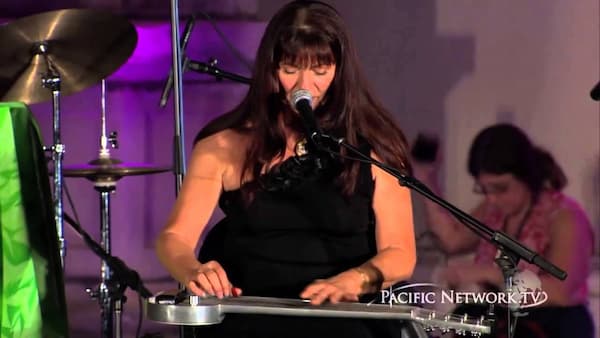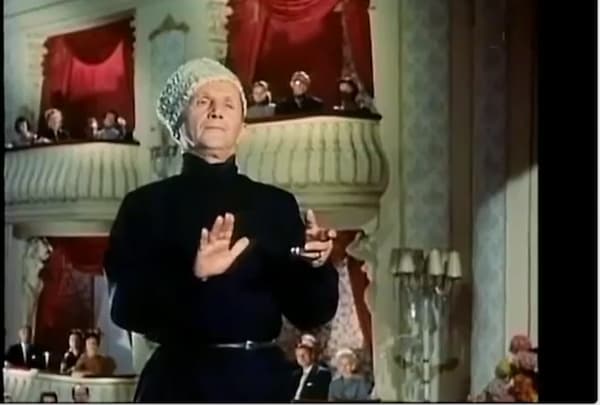Now in her 70s, musician Owana Salazar fights hard to keep alive the traditions of her native country.
As musicians go, she certainly has an unusual profile – a steel guitarist who is not only an eminent instrumentalist with numerous Grammy Award-winning albums but also a claimant to a deposed Oceanic throne.

Owana Salazar
Yet, in her native Hawaii, Owana Salazar is at the forefront of maintaining her country’s traditional culture – and it is a battle that is making steady progress.
Born in 1953, Salazar’s education was an eclectic mix of classical and indigenous folk techniques. Having been raised in a musical household – her father sang opera and her mother composed piano music – she continued her musical journey studying voice, piano, guitar, Javanese dance and gamelan techniques at The Kamehameha Schools and the University of Hawaii at Manoa.
It was while a student that Salazar discovered the swooning sound of the slack-key guitar, which to many is about as Hawaiian as music gets: the instrument, in her words, ‘embodies the spirit of our people and the soul of our land’. Under the tutelage of Jerry Byrd, a renowned steel guitarist, she became the first woman to graduate from his programme in 1992, marking her as a pioneer in Hawaiian music. Throughout the 1980s and beyond, Salazar performed across Hawaii and internationally, earning recognition for her skill and commitment to preserving Hawaiian musical traditions. Her musical influences ranged from classical composers like Bach and Rachmaninoff to folk legends such as Joni Mitchell, which contributed to her distinctive fusion of traditional Hawaiian sounds with broader musical genres. Her notable releases include her debut album ‘Owana and Kaʻipo, In Kona’ (1986), which was nominated for the Na Hoku Hanohano Awards, and her self-titled follow-up ‘Owana,’ released in 1987.
“Hula Blues” @SlackKeyShow Owana Salazar at the Slack Key Show on Maui
Owana Salazar’s lineage is deeply intertwined with Hawaii’s royal history, which plays a key role in her life and advocacy. Through her mother she is a direct descendant of King Kamehameha I’s eldest brother, Prince Kalokuokamaile, tracing her ancestry back to the royal family that played a crucial role in uniting the Hawaiian Islands under a single rule in 1810. This achievement established the Kingdom of Hawaii, a unified Polynesian monarchy that governed the islands for much of the 19th century.
The monarchy itself was a symbol of both strength and political organisation within Polynesia, and it remained a central pillar of Hawaiian identity and governance until the late 1800s. However, in 1893, a group of American businessmen and sugar plantation owners, backed by the U.S. military, orchestrated a coup d’état that overthrew Queen Liliʻuokalani, the last reigning monarch of Hawaii. This was followed by the controversial annexation of Hawaii by the United States in 1898, a move that many Native Hawaiians, including Salazar, believe was never fully legitimised.
The overthrow and annexation remain contentious topics, with proponents of Hawaiian sovereignty pointing to the 1993 U.S. Apology Resolution. In this resolution, the U.S. Congress acknowledged that the overthrow of the Hawaiian Kingdom was carried out with the active participation of American agents and military forces. It also recognised that Native Hawaiians never formally relinquished their claims to sovereignty over their national lands.
Salazar’s connection to this history is significant, not just because of her royal descent but also due to her vocal support for restoring Hawaiian sovereignty. She has called for public hearings in the U.S. Congress to address the legitimacy of Hawaii’s annexation, arguing that her homeland should be restored as a self-sufficient monarchy. Her advocacy positions made her as an important figure within the broader Hawaiian sovereignty movement, which seeks to address historical injustices and reclaim the islands’ independence.
The Hawaiian monarchy, once a symbol of unity for the islands, was transformed under increasing Western influence during the 19th century. Key historical moments, such as the signing of the Bayonet Constitution in 1887, weakened the monarchy’s power, leading to eventual U.S. control. For Salazar, these events represent a fundamental breach in Hawaiian sovereignty—a sentiment shared by many in the Hawaiian independence movement.

Owana Salazar
Today, Salazar uses her platform as a musician and cultural ambassador to draw attention to this history and advocate for a reevaluation of Hawaii’s political status. On Hawaiian sovereignty, she states: ‘We must make public to the world that annexation was a non-event and therefore Hawaii is still a kingdom. There was no treaty of annexation.’ Her Kamehameha Foundation is an organisation dedicated to preserving and promoting Hawaiian culture, education, and the legacy of King Kamehameha I. Its mission centres on supporting Native Hawaiian causes, particularly in the areas of education, health, and cultural preservation. The foundation plays a key role in fostering the well-being and advancement of the Hawaiian community while also ensuring that the historical and cultural contributions of the Hawaiian monarchy are remembered and celebrated. Through scholarships, grants, and cultural initiatives, the Kamehameha Foundation remains a significant force in the protection of Hawaiian heritage.
By combining her musical talents with her royal heritage, Owana Salazar represents a bridge between Hawaii’s rich cultural traditions and the ongoing struggle for sovereignty. Through her efforts, she seeks to keep the spirit of the Hawaiian Kingdom alive.
A leading performer for over twenty years, Matthew Schellhorn regularly appears at major venues and festivals throughout the UK and has recorded numerous critically acclaimed albums. Described as a pianist of “searching intelligence and magnificent technique”, he has a distinctive profile displaying consistent artistic integrity and a commitment to bringing new music to a wider audience. In addition to his work on the concert platform, Matthew Schellhorn is a passionate educator and communicator, giving regular masterclasses and workshops in the UK and abroad.He has visited many university music departments and conservatoires to talk about his work in a wide range of performance contexts, including performance practice, commissioning and interpreting new works, working with today’s composers and bringing out fresh ideas in the interpretation of well known repertoire. He maintains a private teaching practice from his home in London. www.matthewschellhorn.com
For more of the best in classical music, sign up for our E-Newsletter




